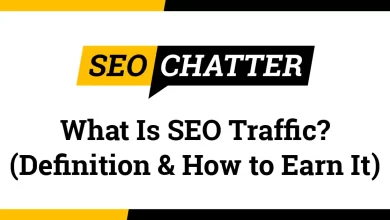Are Blog Keyword Targets Necessary? -SEO Guide

The following question was asked in an online discussion: “Should blogs always have keyword optimization in mind in H1’s and title tags?”
Although I did not ask my partner Randy Ray for his opinion, I know from working with him for many years that he prefers to target some type of query (possibly more than one) with every article he writes. He has a very strong affiliate marketing background and many of his SEO projects for his own sites and his former employers (as well as our clients) have been keyword-focused.
If you can identify good queries that aren’t over-optimized (highly competitive), of course you want to do everything you can to optimize for those queries. But if that is all you do then you’re putting all your eggs into one philosophical basket (keyword competition).
Web Traffic Didn’t Always Depend on “Keywords”
When I built my first Website in 1996 I didn’t even know search engines existed. I created the kind of site I thought I would enjoy reading. I announced it on a couple of CompuServe forums and within days people began emailing me. They were surprised someone had taken the time to write thoughtful essays for a Website. And they appreciated the simplicity of my site design (forced upon me by CompuServe’s woefully inadequate Web design interface).
In 1996 there weren’t that many Websites – only a few hundred thousand at most. And most of them were not very interesting. People linked to each other freely because we were truly building the Web at the time.
My only goal for several years was to build traffic to my sites. I didn’t do much for monetization. I spent so much time creating content, managing volunteer communities, and writing scripts for our sites I couldn’t think about monetization. My first real monetization channel came from eUniverse. They licensed advertising space on high traffic Websites and threw up banner ads. We started running their ads about 3 months before the Dot-Com meltdown kicked in. The checks were nice while they came in but one day eUniverse sent out an email to everyone saying – essentially – “sorry, but we’re about to go out of business. So long and thanks for all the page views.”
There is still an eUniverse today but I don’t know if it’s the same company. The banner network business model never really came back after 2000/2001’s financial crisis. We had gone through a painful, time-consuming migration to eUniverse’s woefully inadequate server farm and had to find a new home very quickly again. It wasn’t long after that we were finally forced to begin leasing dedicated servers.
That history explains why I’ve never been all about chasing keywords. It was all I could do to keep up with the communities I had built around my essays, hosting fan fiction and discussion forums, and the various TV show guides and directories we had built.
We simply created content that interested us and people came to it. They linked to it. They tried to compete with it.
You Can Create Your Own Keywords
I have explained this to journalists many times through the years. If your Website already has an audience (and most major news organizations were able to build audiences very quickly by transitioning their viewers and print subscribers to online visits), all you really need to do is publish content people want to read.
That’s incredibly simplistic but it’s the basis of “Build It Because They Are Already Here”. This approach to Web marketing is no longer viable because everyone with an offline audience who could migrate online HAS migrated online.
That said, you can still build up a loyal audience through multiple promotion channels:
- Online Advertising (it’s fast and you can target it)
- Offline advertising (radio, TV, print ads, packaging, vehicle display, roadside signs, etc.)
- Publicity and public relations (interview tours, cultivating journalistic stories, etc.)
- Social media shares
- RSS subscriptions (not as effective as 10-15 years ago)
- Search engine optimization
I listed those promotional channels in order of effectiveness (in my opinion – other opinions may differ). I think SEO is a terrible channel for building an audience because regardless of whether you are doing keyword research and targeting articles at the queries or just creating content, this is a hard row to hoe.
Still, even random SEO works. Randy and I use it to build up our portfolio. We have enough Websites to work with that if we decide to write something crazy we can usually find a place for it. Some of the articles we thought would take off never did a thing – and some of the articles we thought were pure puff pieces earned hundreds of thousands of page views.
We’ve always got a few articles that bring in people because of purely random craziness. And when we try to replicate those results with targeted content we have about a 50/50 track record of success.
Even when you dominate the keywords and know there is traffic, it’s not easy to chase them. This isn’t about keyword cannibalization. It’s about the peculiarities of people’s tastes and interests. They’ll click on one site in a search result and completely ignore another no matter how well it ranks.
Optimizing for Concepts Is Largely Bullshit, In My Opinion
Many SEO bloggers now tell you to stop targeting keywords and write about topics or concepts. That was never what I had in mind. In 2015 I wrote an article on SEO Theory titled “How to Write Copy for Search Engines” (Cf. https://tinyurl.com/copy-4-search ). One of the points I made in that article was this: “If you talk about, think about, research keywords or do anything on a Website that relates to ‘keyword research’, ‘topic research’, whatever — you’re lying if you think you are writing for people. You’re writing for search engines.”
The whole point of targeting topics or concepts isn’t to be a subject matter expert. It’s to improve your search optimization because somewhere along the way someone argued convincingly that search engines no longer care about “keywords” (queries) — now they care about “topics” and “entities”.
The algorithms still care very much about specific queries. Google wouldn’t be predicting what you’re about to type into the search box or adding “People also search for” suggestions to the SERPs if they weren’t focused on specific queries.
*=> Choosing a topic should be about building knowledge, not traffic.
Randy often tells people to think about topics, not keywords. But what I have learned from Randy is to watch what he does. Yes, he picks a topic and works it from every angle. But he studies that topic as thoroughly as possible. He hates to write pure fluffy crap. He’ll do it just like we all do it. But years later when we look at old content Randy is his own harshest critic.
I suppose I am, too.
It’s hard for me to write about some topics because I care so little for them. The clients want little more than for someone to round up a bunch of talking points and pad them out with thoughtful commentary. It’s not supposed to be meaningless fluff – it’s supposed to be new angles on old, well-covered topics. But it often turns out to ba a struggled in maintaining one’s sanity.
The relationship between how much you enjoy discussing a topic and how many ways you can describe it is very strong. It’s a powerrful keyword engine. If you are both passionate and knowledgeable about a topic you don’t need to do keyword research. You already know what people are searching for. You’ve probably used the queries yourself.
We’re not optimizing for topics – we’re creating content for specific queries that we arbitrarily group together in topics. Search engine toponymy (classification of documents by “names” or “topics”) is very crude. It’s so primitive that Google provides almost no methods for searching by topic or category.
If you type the name of a local grocer (in your area) into Google, you’ll probably see a Knowledge Box with information about that company. If it’s a major brand you know someone has set up Google My Business with the category information (like “grocer”).
*=> So why doesn’t Google let you click on the category tags when you search for your local grocer?
Search for “dentist”, “doctor”, “gas station”, “restaurant” – almost none of them allow you to click on category tags to refine your query.
You can choose a restaurant by cuisine. I can’t find another type of local business where I can refine the query by anything other than “rating” (if avaiable) or “hours”.
Whatever Google is doing with all those category tags GMB specialists create, it’s not helping searchers refine their queries.
Search engine optimization is not, never has been, and probably never will be “about topics”. It’s about keywords.
You either find (chase) keywords or you create them.
How to Create Keywords
Until a few weeks ago no one was searching for “covid-19”. Now everyone is. Some epidemiologist somewhere came up with this crazy phrase. It’s not a brand name but it’s an entity name.
As soon as people began publicizing the entity name other people began searching for it.
Google invested so many resources into entity classification because every query people type in is about “a person”, “a place”, or “a thing”. The “thing” category is very broad. It might be something like “how to pour a glass of water” or it might be “red colors of sunset”. They’re still entities.
*=> All queries are about entities.
And if all queries then all your content should be about specific entities. A topic or a concept is an entity but it’s a level of abstraction beyond what searchers are usually interested in. If you search Google for “philosophy” it’s not going to teach you about philosophy. It may include a Website about a product named “Philosophy”, include a dictionary definition, show you some encyclopedia articles, and maybe toss in some educational resources.
The problem with an abstract query like “philosophy” is that it really doesn’t refer to any one specific thing. So a search engine has no way of determining what is best to show you.
If you’re going to create a new query, you must define a new entity. It could be “the kid who steals shoes in my back yard”. Get enough people interested in that phrase and they will search for it. They’ll link to something using that phrase as the anchor text. It will become a meme that people share.
That’s an entity.
Search for “woman cat meme” and you’re searching for an entity, even if there are multiple memes that could fit that description. The entity is a specific TYPE of thing, and it has been redefined by the popular dual-image meme of a woman yelling toward the right and a white cat looking back at her from the right.
In other words, to create a new keyword you must define a memorable entity. You can reuse an entity but you must attach a new association to it so thoroughly that people think about your definition.
Your Opinion Contributes to Entities
Many affiliate marketers target keywords like “product X reviews” and “best product X”.
These are compound entities consisting of THINGS and OPINIONS. A compound entity is an abstraction and the search engine algorithms (thus far) can only handle the abstraction by focusing on specific queries.
If you compare the search results for “amazon echo reviews” and “best amazon echo” you should — like me — see completely different results. These queries are very similar in scope and nature. One is more precise than the other and that precision creates a sufficient semantic distinction that the algorithms go in completely different directions.
If the content is relevant enough to both queries it will appear in both queries, but not because the queries are equivalent. If you search for “best samsung galaxy” and “samsung galaxy reviews” you should find (as I did) a TechRadar article titled “Samsung phone: how to find the best Samsung smartphone …”
Each SERP uses its own descriptive text snippet for the article. This is not a great example, though, because TechRadar simply embedded the article title in the meta description field. Google had no choice but to contrive descriptive text snippets for the search results.
The article expresses an opinion about a type of product. The article itself is the entity and it’s part of a class of compound entities.
People search for compound entities and it’s arguable they are more likely to convert when searching for compound entities, although there may be several layers of compound entities in the consumer journey from initial discovery/exploration to purchase.
Conclusion
Coming back to the original question: is it necessary or preferable to assign keyword targets to blog posts?
I would say IT DEPENDS. It depends on how strong your relationship is with your reading audience. And it depends on whether you are in a position to define a new entity, either as a label (like “covid-19”) or as a compound (which is what most people do).
You can create compound entities relatively easily and quickly. Just be the first person to express an opinion about an entity.
The real question, in my opinion, is whether you should target very popular, highly competitive keywords in your blog posts. But that’s a topic for another day.
Related
#Blog #Keyword #Targets





